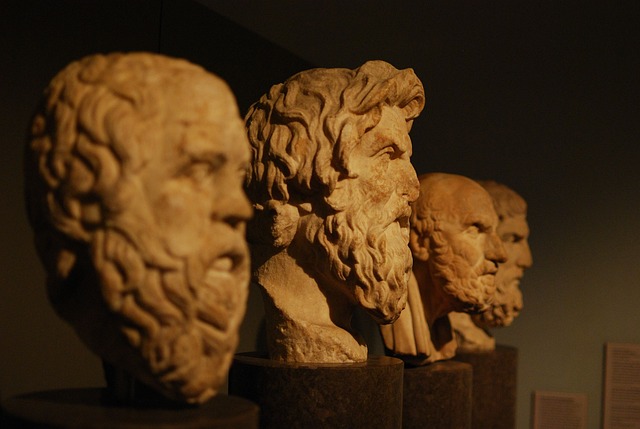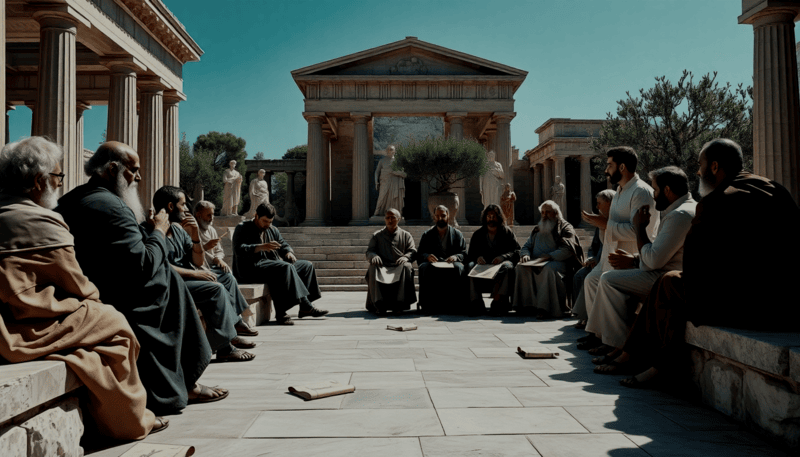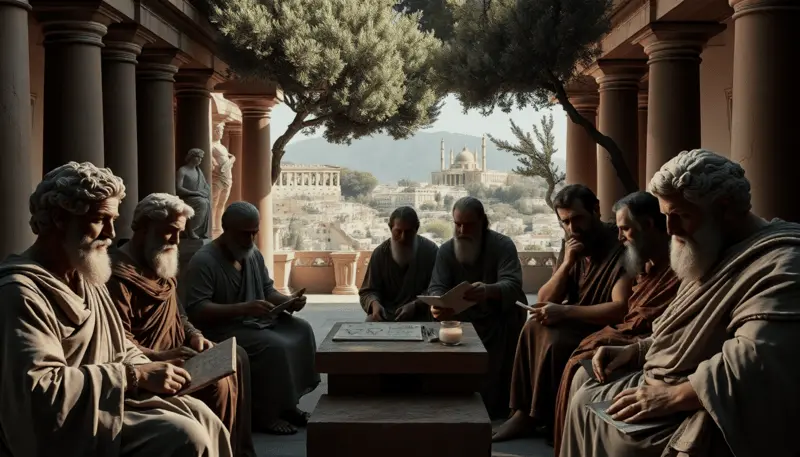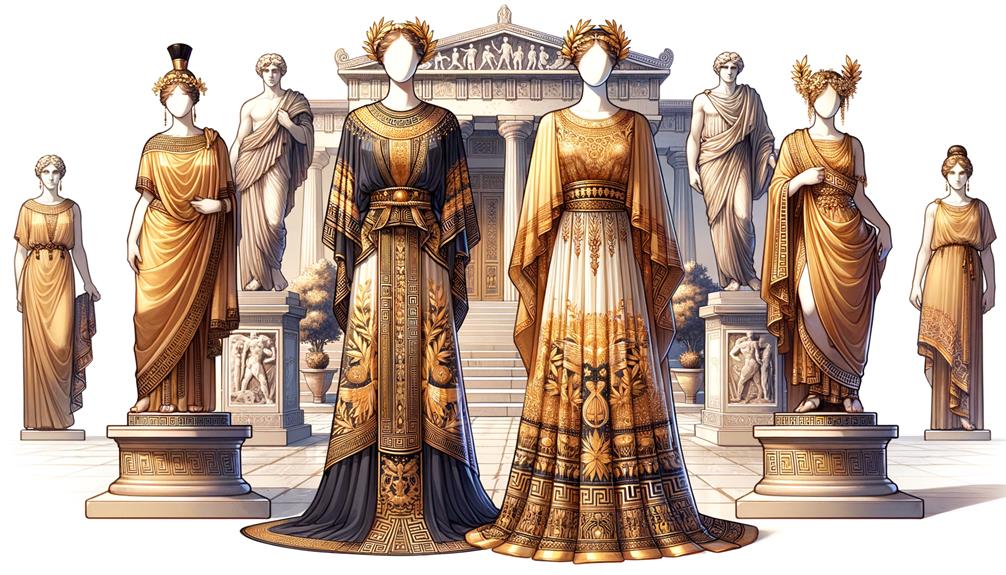The ancient Greek philosophers laid the foundation of Western philosophy and continue to influence modern thought profoundly. Emerging in a society steeped in mythological beliefs, these thinkers sought rational explanations for the world around them. Their questions about existence, morality, and knowledge remain timeless, offering valuable insights into human nature and the universe.
The relevance of their ideas today lies in their universality. From ethics to politics and science to art, their contributions resonate across disciplines. To begin with, their philosophies encourage critical thinking, self-reflection, and the pursuit of truth—values vital in any era. In this article, we will explore the lives, teachings, and legacies of key ancient Greek philosophers. By delving into their groundbreaking ideas, we aim to uncover how they shaped human thought and why their wisdom remains unparalleled.

Who Were the Ancient Greek Philosophers?
Philosophy, derived from the Greek words philo (love) and sophia (wisdom), was a way of life in ancient Greece. It was not merely an intellectual pursuit but a guide to understanding existence and achieving a virtuous life. In ancient Greek society, philosophy served as a beacon for exploring human nature, ethics, and the cosmos.
The evolution of Greek philosophy can be divided into three main periods: the Pre-Socratic, Classical, and Hellenistic eras. Each period contributed uniquely to the development of philosophical thought.
- Pre-Socratic Period: Thinkers like Thales and Pythagoras focused on understanding the universe’s fundamental principles, moving away from mythological explanations.
- Classical Period: Dominated by Socrates, Plato, and Aristotle, this era delved into ethics, politics, and metaphysics, establishing frameworks that still guide modern discourse.
- Hellenistic Period: Philosophers such as Epicurus and the Stoics emphasized personal happiness and practical living, adapting philosophical ideas for everyday life.
In addition, the vibrant cultural and historical context of ancient Greece—marked by democratic governance, artistic achievements, and scientific curiosity—created fertile ground for intellectual exploration. For instance, the city-state of Athens became the cradle of philosophical thought, attracting brilliant minds and fostering debate. Moreover, Greek philosophy’s origins demonstrate a shift from mythological to logical reasoning, making it a cornerstone of Western intellectual history. They were Quite different from that of Ancient Egyptians in many Fields.

Key Ancient Greek Philosophers and Their Contributions
Socrates – The Father of Western Philosophy
Notably regarded as the father of Western philosophy, Socrates revolutionized how humans perceive morality and knowledge. His method of questioning—known as the Socratic Method—encouraged critical thinking through dialogue and introspection. Socrates believed that self-knowledge was the key to living a virtuous life. For example, his probing questions like “What is justice?” compelled individuals to think deeply about their values. Although he left no written works, his teachings influenced his pupil Plato, shaping the course of Western thought.
Plato – The Idealist
Plato, Socrates’ most prominent student, furthered his teacher’s ideas while introducing his vision. His seminal work, The Republic, explored the concept of justice and the ideal state. Plato introduced the theory of ideal forms, suggesting that true reality lies beyond physical existence. On the other hand, Plato’s Academy, the first institution of higher learning, became a hub for intellectual pursuits, setting the standard for education. His influence extended beyond philosophy, impacting politics, art, and science.
Aristotle – The Practical Philosopher
Aristotle, Plato’s most renowned student, took a more empirical approach. His works on logic, ethics, biology, and politics laid the groundwork for numerous disciplines. Aristotle’s Nicomachean Ethics emphasized the pursuit of happiness through virtue, while his Politics explored governance systems. For example, his logical frameworks became the basis of scientific inquiry, influencing fields as diverse as astronomy and medicine. Aristotle’s practical philosophy underscores his enduring impact across intellectual domains.
Other Influential People among Ancient Greek Philosophers
Similarly, the Pre-Socratic thinkers laid the groundwork for Greek philosophy. Thales, considered the first philosopher, proposed that water was the fundamental substance of the universe. Pythagoras, best known for his mathematical theorem, viewed numbers as the essence of reality. Heraclitus emphasized change, famously stating, “You cannot step into the same river twice.” In contrast, the Hellenistic period brought philosophers like Epicurus and the Stoics, who focused on practical philosophy. Epicurus advocated for simple living and personal happiness, while Stoicism, founded by Zeno of Citium, emphasized resilience and rationality. Thus, these thinkers expanded the scope of philosophy, making it relevant to personal and societal well-being. Explore ancient Chinese Religions.

Legacy of Ancient Greek Philosophers
The legacy of ancient Greek philosophers is profound, shaping Western thought in politics, ethics, and science. Their ideas laid the groundwork for democratic governance, with thinkers like Plato and Aristotle influencing the principles of justice and citizenship. Moreover, their impact extends to modern philosophy, with concepts like Aristotle’s logic and Socratic questioning forming the basis of contemporary thought. In popular culture, their teachings inspire literature, films, and leadership principles, demonstrating their timeless relevance. Therefore, as a result of their enduring contributions, ancient Greek philosophers remain beacons of wisdom. Their intellectual pursuits remind us of the importance of curiosity, reasoning, and ethical living.
Ancient Greek and Roman medicine what did doctors do ?
Ancient Greek and Roman medicine laid the foundation for modern medical practices, blending natural philosophy with practical healing methods. Physicians in these civilizations approached medicine as both a science and an art, deeply rooted in observation and rational analysis. In ancient Greece, doctors like Hippocrates, often called the “Father of Medicine,” emphasized the importance of diagnosing diseases based on symptoms and environmental factors. He introduced the famous Hippocratic Oath, a guiding ethical principle for medical practitioners. Greek doctors believed in balancing the body’s four humors—blood, phlegm, yellow bile, and black bile—to maintain health. Treatments ranged from herbal remedies and dietary adjustments to surgical interventions, such as setting fractures or performing rudimentary operations. Similarly, ancient Roman physicians adopted and expanded on Greek medical knowledge, prioritizing hygiene, sanitation, and preventive care. For instance, public baths, aqueducts, and sewer systems were integral to Roman health practices, reflecting their commitment to public health.
Doctors in ancient Greek and Roman times utilized a variety of tools and techniques to treat ailments. They performed bloodletting to restore balance, prescribed complex herbal concoctions, and used tools like scalpels, forceps, and cautery devices for surgical procedures. Roman military doctors, in particular, were pioneers in trauma care, developing techniques for treating wounds and fractures sustained in battle. They also established valetudinaria—early forms of military hospitals—to ensure soldiers received timely medical attention. Both Greek and Roman doctors emphasized holistic care, focusing not only on the physical body but also on the mental and emotional well-being of patients. This integrated approach, combined with their groundbreaking innovations, shaped the evolution of medicine and influenced practices for centuries to come. By exploring ancient Greek and Roman medicine, we gain insight into the origins of healthcare and the enduring contributions of early doctors to the medical field.

Conclusion
In conclusion, ancient Greek philosophers were not just thinkers of their time but visionaries whose ideas transcended centuries. They challenged conventional beliefs, laid the groundwork for rational inquiry, and emphasized the pursuit of knowledge as a path to understanding the world and our place in it. Figures like Socrates, Plato, and Aristotle did not just shape philosophy; they influenced science, politics, and art, leaving an indelible mark on human history.
To sum up, their teachings remind us of the value of self-reflection, the importance of questioning the status quo, and the necessity of striving for wisdom in our lives. Whether through Socrates’ probing questions, Plato’s ideals, or Aristotle’s practical insights, these philosophers offer timeless guidance that remains relevant in the complexities of modern life. Their legacy is not confined to ancient texts but lives on in the way we think, govern, and innovate.
Overall, studying the works and ideas of these pioneers provides a window into the origins of Western thought and an opportunity to draw inspiration from their intellectual courage. By exploring their philosophies, we gain not only historical perspective but also practical tools for navigating today’s challenges. The wisdom of ancient Greek philosophers continues to illuminate paths toward truth, justice, and personal growth, making them true pioneers of human thought and understanding.



